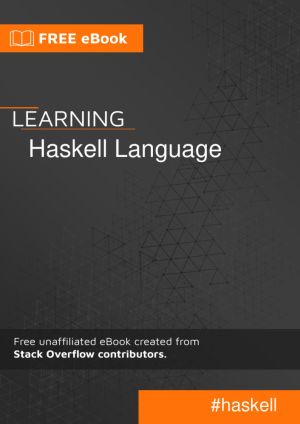Learning Haskell
by Stack Overflow Community
DescriptionTable of ContentsDetailsHashtagsReport an issue 






Book Description
Haskell is a general-purpose, statically typed, purely functional programming language with type inference and lazy evaluation. It is an unofficial and free Haskell book created for educational purposes. All the content is extracted from Stack Overflow Documentation, which is written by many hardworking individuals at Stack Overflow.This open book is licensed under a Creative Commons License (CC BY-SA). You can download Learning Haskell ebook for free in PDF format (2.1 MB).
Table of Contents
Chapter 1
Getting started with Haskell Language
Chapter 2
Applicative Functor
Chapter 3
Arbitrary-rank polymorphism with RankNTypes
Chapter 4
Arithmetic
Chapter 5
Arrows
Chapter 6
Attoparsec
Chapter 7
Bifunctor
Chapter 8
Cabal
Chapter 9
Category Theory
Chapter 10
Common functors as the base of cofree comonads
Chapter 11
Common GHC Language Extensions
Chapter 12
Common monads as free monads
Chapter 13
Concurrency
Chapter 14
Containers - Data.Map
Chapter 15
Creating Custom Data Types
Chapter 16
Data.Aeson - JSON in Haskell
Chapter 17
Data.Text
Chapter 18
Databases
Chapter 19
Date and Time
Chapter 20
Fixity declarations
Chapter 21
Foldable
Chapter 22
Foreign Function Interface
Chapter 23
Free Monads
Chapter 24
Function call syntax
Chapter 25
Function composition
Chapter 26
Functor
Chapter 27
Generalized Algebraic Data Types
Chapter 28
GHCJS
Chapter 29
Google Protocol Buffers
Chapter 30
Graphics with Gloss
Chapter 31
Gtk3
Chapter 32
Higher-order functions
Chapter 33
Infix operators
Chapter 34
IO
Chapter 35
Lens
Chapter 36
List Comprehensions
Chapter 37
Lists
Chapter 38
Logging
Chapter 39
Modules
Chapter 40
Monad Transformers
Chapter 41
Monads
Chapter 42
Monoid
Chapter 43
Optimization
Chapter 44
Overloaded Literals
Chapter 45
Parallelism
Chapter 46
Parsing HTML with taggy-lens and lens
Chapter 47
Partial Application
Chapter 48
Phantom types
Chapter 49
Pipes
Chapter 50
Profunctor
Chapter 51
Proxies
Chapter 52
QuickCheck
Chapter 53
Reactive-banana
Chapter 54
Reader / ReaderT
Chapter 55
Record Syntax
Chapter 56
Recursion Schemes
Chapter 57
Rewrite rules (GHC)
Chapter 58
Role
Chapter 59
Sorting Algorithms
Chapter 60
Stack
Chapter 61
State Monad
Chapter 62
Streaming IO
Chapter 63
Strictness
Chapter 64
Syntax in Functions
Chapter 65
Template Haskell & QuasiQuotes
Chapter 66
Testing with Tasty
Chapter 67
Traversable
Chapter 68
Tuples (Pairs, Triples, ...)
Chapter 69
Type algebra
Chapter 70
Type Application
Chapter 71
Type Classes
Chapter 72
Type Families
Chapter 73
Typed holes
Chapter 74
Using GHCi
Chapter 75
Vectors
Chapter 76
Web Development
Chapter 77
XML
Chapter 78
zipWithM
Book Details
Title
Learning Haskell
Subject
Computer Science
Publisher
RIP Tutorial
Published
2019
Pages
296
Edition
1
Language
English
PDF Size
2.1 MB
License

Related Books

This book presents a synopsis of six emerging themes in adult mathematics/numeracy and a critical discussion of recent developments in terms of policies, provisions, and the emerging challenges, paradoxes and tensions. It also offers an extensive review of the literature adult mathematics education. Why do adults want to learn mathematics? Did they...

This book summarizes the vast amount of research related to teaching and learning probability that has been conducted for more than 50 years in a variety of disciplines. It begins with a synthesis of the most important probability interpretations throughout history: intuitive, classical, frequentist, subjective, logical propensity and axiomatic vie...

It argues that the main purpose of educational research is to improve student learning, and that international comparative studies are no exception....

This book provides a systematic overview of experiences with Inquiry-Based Learning (IBL) and undergraduate research (UR) in German universities, covering both research universities (Universitäten) and universities of applied sciences (Fachhochschulen). Divided into three parts, the book starts with the principles and common practices of IBL/UR at...

This book deals with the relevance of recognition and validation of non-formal and informal learning in education and training, the workplace and society. In an increasing number of countries, it is at the top of the policy and research agenda ranking among the possible ways to redress the glaring lack of relevant academic and vocational qualificat...

This book provides a practical philosophy for promoting students' sophisticated thinking from Early Childhood to PhD in ways that explicitly interconnect across the years of education. It will help teachers, academics and the broader learning and teaching community to understand and implement these connections by introducing a conceptual frame...

